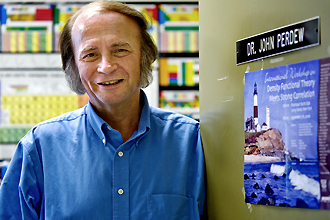Perdew Chosen for Top Scientific Honor
John Perdew, professor of physics in the Tulane School of Science and Engineering, is a newly elected member in the prestigious National Academy of Sciences.

“My thanks to the academy for electing me and to Tulane for making it all possible,” says Tulane physicist John Perdew about his election to the prestigious National Academy of Sciences. (Photo by Paula Burch-Celentano)
Members of the academy, composed of about 2,000 distinguished scientists from all fields, advise the U.S. government on science policy. Election to the academy, founded in 1863, is considered one of the highest honors that can be accorded a scientist or engineer.“I'm very honored to be included among this group,” Perdew says.
Perdew is a leader in the development of density functional theory, which is now widely used in many fields to calculate fundamental properties of materials.
“Tulane gave me the chance to do the research that I wanted to do in the density functional theory of atoms, molecules and solids,” Perdew says. “My thanks to the academy for electing me and to Tulane for making it all possible.”
Perdew came to Tulane in 1977. He has received many honors for his teaching and research at Tulane, including the first annual Outstanding Researcher Award of the School of Science and Engineering in 2007 and the President's Award for Excellence in Graduate and Professional Teaching in 2009.
He received his doctorate in physics from Cornell University in 1971. He held postdoctoral fellowships at the University of Toronto and Rutgers University and was a visiting scientist at the Nordic Institute of Theoretical Physics in Copenhagen, Denmark, before coming to Tulane.
The April 2009 issue of the Journal of Chemical Theory and Computation, the magazine of the American Chemical Society, was dedicated to him in honor of his 65th birthday.
“Tulane University is extremely fortunate to have a scholar of Dr. Perdew's stature on our faculty,” says Nicholas Altiero, dean of the School of Science and Engineering. “His impact in his field has been enormous, and he is richly deserving of induction into the National Academy of Sciences.”
